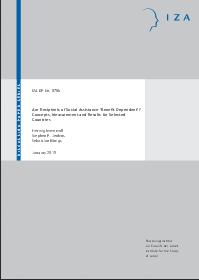Immervoll, H., Jenkins, P. S. & Königs, S. (2015) “Are Recipients of Social Assistance ‘Benefit Dependent’? Concepts, Measurement and Results for Selected Countries“, Institute for the Study of Labor (IZA), Discussion Paper No. 8786, Ιανουάριος 2015. ABSTRACT Are Recipients of Social Assistance ‘Benefit Dependent’? Concepts, Measurement and Results for Selected Countries Means-tested Social Assistance (SA) benefits play an important role as social protection floors supporting households in financial difficulties. …Read More
Quantitative easing in euro zone requires shared risk
Gros, D. & Kopf, C. (2015) “Quantitative easing in euro zone requires shared risk“, Centre for European Policy Studies: Economic Policy, Researchers’ work published externally, 21 Ιανουαρίου. In their column published online by Reuters, Daniel Gros and Christian Kopf offer their assessment of the programme of sovereign bond purchases to be undertaken shortly by the European Central Bank in the euro area. They examine in particular the accounting technique …Read More
Tsipras And Syriza’s Win Reboots European Social Democracy
Gow, D. (2015) “Tsipras And Syriza’s Win Reboots European Social Democracy“, Social Europe Journal, 26 Ιανουαρίου. The “vicious circle of austerity is over,” said Alexis Tsipras, Syriza leader and Greece’s likely new premier, after his party won a stunning victory in yesterday’s general election. It would be replaced, he added, by “a politics of hope, solidarity and co-operation.” He and his senior colleagues say this is true for the …Read More
The return of the German question: why conflict between creditor and debtor states is now the defining feature of European politics
Kudnani, H. (2015) “The return of the German question: why conflict between creditor and debtor states is now the defining feature of European politics“, LSE EUROPP, 26 Ιανουαρίου. One of the key geopolitical issues in Europe prior to the Second World War was how the power of Germany could be effectively balanced by other European states. Hans Kundnani assesses the relevance of these historical debates to the current situation …Read More
The ECB’s bond-purchase dilemma – German opposition to government-bond purchases by the European Central Bank is solidifying ahead of the programme’s likely announcement
Wolff, Β. G., Fratzscher, M. & Hüther, M. (2015) “The ECB’s bond-purchase dilemma – German opposition to government-bond purchases by the European Central Bank is solidifying ahead of the programme’s likely announcement“, Bruegel Institute, 21 Ιανουαρίου. German opposition to government-bond purchases by the European Central Bank is solidifying ahead of the programme’s likely announcement on January 22. Elections in Greece that could bring a government that will seek to …Read More
Opening of national research programs: different national answers to international pressures?
Primeri, Ε. (2015) “Opening of national research programs: different national answers to international pressures?“, Europe of Knowledge Blog, Ideas on Europe, 16 Ιανουαρίου. In a funding and policy context as deeply changed as the European one, the opening of national research programs has become an important instrument for national governments and funding agencies to increase international collaboration and to improve the quality and efficiency of scientific research. The opening …Read More
Denmark should abandon its euro peg
Mitchell, B. (2015) “Denmark should abandon its euro peg, Bill Mitchell Blog, 21 Ιανουαρίου. In my soon-to-be-published book on the Eurozone I examined the case of Denmark in some detail in the context of the evolution of the European Monetary System, the European Exchange Rate Mechanism (ERM), and the ratification process of the Treaty of Maastricht. Denmark was a participant in all the attempts to maintain fixed exchange rates …Read More
‘More Europe’ in 2015? For the EU, relevance on the world stage starts with common economic and security policies
Crowley, M. (2015) ‘More Europe’ in 2015? For the EU, relevance on the world stage starts with common economic and security policies, US News and World Report, 21 Ιανουαρίου. The new year brought news that in the third quarter of 2014 the United States experienced its strongest annual growth – five percent – since 2003. Meanwhile, the European Union stagnates, managing only a 0.2 percent growth rate for the …Read More
The European Union, Nationalism and the Crisis of Europe
Friedman, G. (2015) “The European Union, Nationalism and the Crisis of Europe“, STRATFOR, 20 Ιανουαρίου. Last week, I wrote about the crisis of Islamic radicalism and the problem of European nationalism. This week’s events give me the opportunity to address the question of European nationalism again, this time from the standpoint of the European Union and the European Central Bank, using a term that only an economist could invent: …Read More
Will R&D tax incentives get Europe growing again?
Gaillard, E. & Straathof, B. (2015) “Will R&D tax incentives get Europe growing again?“, VoxEU Organisation, 20 Ιανουαρίου. Tax incentives have become a common policy tool for encouraging firms to spend more on research and development – and the recession has further raised interest in the effectiveness of this policy. This column highlights a new review of the empirical evidence, which suggests that fiscal incentives for R&D only modestly …Read More







